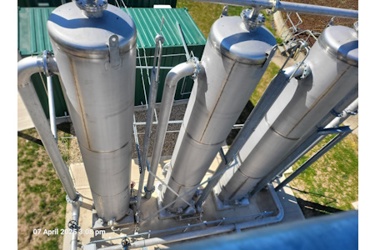UK's First Micropollutant Removal Plants Using Ozone Technology Go Live

New wastewater treatment facilities designed and built by Curio Water will help to clean bathing waters, as part of Severn Trent’s Green Recovery Plan, as an additional step to the water company’s normal wastewater treatment process.
In a UK first, the micropollutant removal plants have officially gone on stream at Severn Trent’s Frankton, Ludlow and Itchen Bank sites, marking a major milestone in the industry’s efforts to tackle micropollutants in its rivers and bathing water sites.
While wastewater treatment in the UK is already of a high standard, this extra process uses ozone gas to reduce bacteria remaining at the end of the normal sewage treatment course.
This trial is an industry first and enhances the treatment process even further by making it as clean as possible. It has been delivered via collaboration between Curio Water, Severn Trent, and Veolia Water Technologies & Solutions.
Micropollutants are defined as trace amounts of contaminants such as pharmaceuticals, pesticides, and chemicals from personal care products, and have become a growing concern due to their ability to persist in the environment and bioaccumulate in ecosystems and human bodies. Unlike more visible pollution, these substances remain largely undetected yet pose a long-term risk to water quality and public health.
Howard Marles, Founder and Managing Director of Curio Water, said: “This partnership with Severn Trent showcases a practical, cost-effective and scalable solution as we enter AMP8 in dealing with one of the water industry’s emerging challenges. Awareness and regulation around water quality in our waterways is intensifying particularly with updates to the EU Urban Wastewater Directive which the UK still adheres to.”
The three plants for Severn Trent are based on the success of Europe’s first micropollutant removal plant in Neugut, Switzerland, which has operated since 2014. It has since become the reference standard for Switzerland to implement its micropollutant removal plan by 2035.
Ozone is used in conventional water treatment, but this is the first time in the UK it has been tested on wastewater to remove micropollutants and antibiotic-resistant bacteria.
Wilfred Denga, Project Lead at Severn Trent, said: “We’re excited to be trialling this new innovation, which will take our wastewater cleaning process one step further. The installation is helping us to do our part in creating rivers that people can enjoy.”
Curio Water is also currently trialling innovative micropollutant removal solutions at its new site at Cranfield University. Technologies, including combinations of ozone, advanced oxidation process (AOP), granular activated carbon (GAC), and ultraviolet (UV) will be tested to remove substances such as common pharmaceuticals and antibiotics, cleaning detergents, PFAS (also known as forever chemicals), microplastics, steroid hormones and pesticides.
At the start of the year, Curio announced a plan to build ten pilot plants that will allow water companies to test and trial different solutions in real-world situations for a wide range of micropollutants across different locations in the UK.
About Curio Water
Curio Water provides ozone, UV and filtration services to the water industry, and has over 30 years’ worth of experience in water treatment applications globally. Curio provided engineering support for Europe’s first micropollutant plant for wastewater treatment in Neugut, Switzerland, which has been operational since 2014. For more information, visit www.curiowater.co.uk
About Veolia
Veolia group aims to become the benchmark company for ecological transformation. Present on five continents with 215,000 employees, the Group designs and deploys useful, practical solutions for the management of water, waste and energy that are contributing to a radical turnaround of the current situation. Through its three complementary activities, Veolia helps to develop access to resources, to preserve available resources and to renew them. In 2024, the Veolia group provided 111 million inhabitants with drinking water and 98 million with sanitation, produced 42 million megawatt hours of energy and treated 65 million tonnes of waste. Veolia Environnement achieved consolidated revenue of 44.7 billion euros in 2024. For more information, visit www.veolia.com.
About Veolia Water Technologies
As the global water technology experts of Veolia, we deliver on both performance and sustainability without compromise. We provide you with peace of mind knowing your business and communities are safeguarded, efficient and resilient. Together we protect, preserve and reuse resources, tackling today’s environmental challenges while creating the water treatment and process solutions of tomorrow. For more information, visit www.watertechnologies.com.
Source: Curio Water
